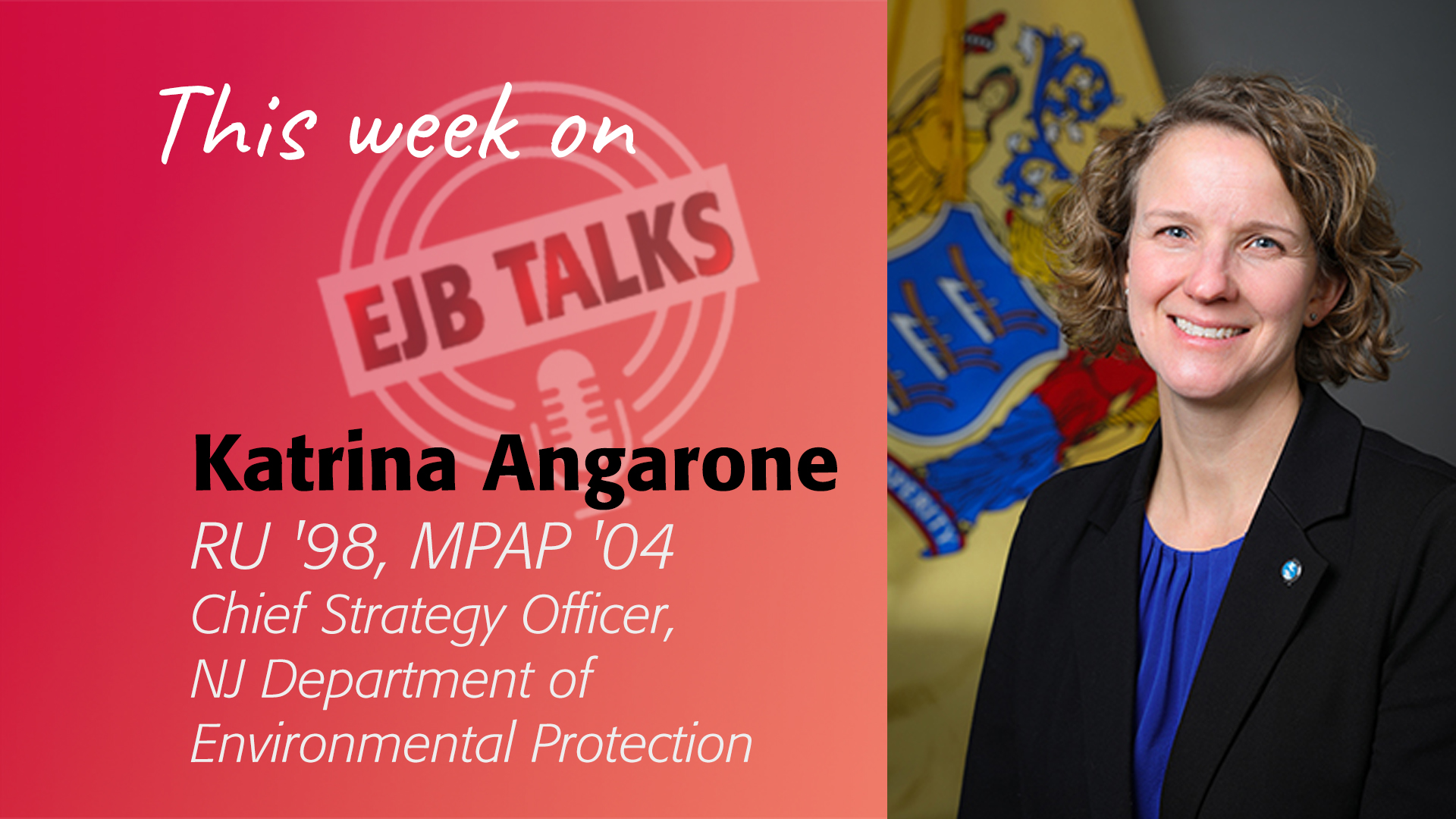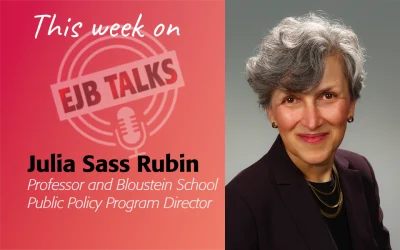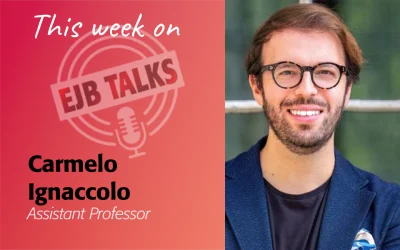A Conversation with Kati Angarone RU ’98, MPAP ’04 on Communicating Environmental Issues to the Public
Read transcript:
Stuart Shapiro
Welcome to EJB Talks. I’m Stuart Shapiro, the Dean of the Bloustein School. And the purpose of this podcast is to highlight the work my colleagues and our alumni in the fields of policy, planning, and health are doing to make the world a better place.
Today, we’re going to speak with an alumna of our public policy program, Kati Angarone, who currently serves as the Chief Strategy Officer for the New Jersey Department of Environmental Protection.
Welcome to the podcast, Katie.
Kati Angarone
Thank you. It’s wonderful to be here.
Stuart Shapiro
So we tend to start these with origin stories. So let’s go back to your decision to pursue a degree in public policy. What made you decide to get your Master’s of Public Affairs and Politics?
Kati Angarone
Sure. Absolutely. So I was working at the New Jersey Department of Environmental Protection at the time, after graduating from Rutgers Cook College, actually with a BS in natural resource management. And I was feeling ready after a couple of years to get my graduate degree. My path at the department had taken some turns.I had started as a GIS intern, believe it or not.
Stuart Shapiro
Yeah.
Kati Angarone
Then I went on to land use permitting, and wetland delineation, which was great and very educational. But I was pulled into the assistant commissioner’s office to do policy and to focus on policy. And I was so excited by that. The idea that I, you know, this young graduate could be helping, and to form, statewide policy was really exciting. And I didn’t want to stop working. And at the time, the state offered tuition reimbursement. So a master’s at Bloustein, which was, of course, a very respected school, still is, where I could still work. And it was affordable. It was just logical.
So I was already knee-deep in the public sector, identifying issues, gathering data, and getting to implement policy decisions. So while I had initially thought that I would be, you know tagging ducks somewhere with a biology degree (laughing), the policy world was sort of tugging at me. And I thought that that seemed like an amazing way to take the science that I loved so much and turn it into action. And I still love that nexus of policy and science.
Stuart Shapiro
So clearly your interest in the environment in general goes back to the tagging ducks (laughing) and your time at SEBS, what is now SEBS. What was then Cook College. So where did that come from? Where did the connection to nature, the connection to science and environment, the interest in those things come from?
Kati Angarone
Sure. I mean, I have to give credit to my late father, who was a steward of the environment. He took me fishing, he took me hunting, birdwatching, always up to Cape Cod, to the marshes and the beach. And he loved nature, so I grew up loving nature. And growing up in the 80s, I feel also like there were a lot of environmental issues in the news.
I can kind of recall collecting change for famine victims in Africa, which of course makes a huge impression when you’re little, you’re thinking about children starving. And somewhere in my youth, my mom, she has also passed away, but I can’t figure out why she did this, but she got me a Newsweek subscription. And in 1988, Newsweek ran this article on the greenhouse effect.
And I remember the cover so clearly. It’s this family of three standing under a bell jar. And I think the tagline was something like, “hotter summers ahead.” That was 36 years ago. And I remembered it so well. I was able to Google it and find it! So I’ve been thinking about climate for almost four decades! (laughing) But I think issues like that, particularly once I started to read them and understand, you know, what we were up against, I really became interested in protecting the environment from that day forward. And making sure that I was walking softly on the earth and that our world was trying to get more sustainable in all that we did.
Stuart Shapiro
It’s funny you mentioned the summer of ‘88 because I remember that summer as being exceptionally hot. I was interning down near Wall Street in New York, and the number, and you know, the first time in my life had to wear a tie to work and all that. And the number of brutally hot days. And I remember that was probably the first time I heard about climate change as well because it entered the consciousness because of this, what at that point was still very anachronistically hot summer at the time there.
Kati Angarone
Yes!
Stuart Shapiro
So I want to get to your current position.
Kati Angarone
Sure.
Stuart Shapiro
But before that, I do want to talk a little bit about your previous position you mentioned. That you were the Assistant Commissioner for Watershed Management at DEP. What does that mean?
Kati Angarone
So, the Assistant Commissioner for Watershed and Lad Management has three programs under them. I’ll talk a little bit about what they do, but I was really returning to my roots when I did the land use permitting. This was one of the groups that I was returning to.
I had wandered a little bit into drinking water for some time, and then I coordinated science and policy across the department. But going back to watershed and land management, I was charged with helping them integrate climate science into their regulations, for example, and making sure that they were aligned with other water programs.
We had just reformed the watershed division and recommitted to a watershed approach. And I was coming back with this valuable experience from all the different programs I had been to, all of whom really were working on clean water goals, but from very different angles. So I was able to bring that to the program. And I think one of the best examples of different programs coming at one issue, would be the summer of 2019. When in New Jersey, one of our most treasured lakes, Lake Hopatcong had this lake-wide, extremely disruptive to the community, harmful algal bloom. And I was brought in to help find a policy path forward that was informed by science, but also by the local voices.
So that was, I think, a brilliant success for five years now. We’ve had this strong partnership with the Lake community who really sprang into quick and informed action. And at the state, we were glad to support it with science and data and funding. And it’s a great example of how watershed protection should work.
So I brought that with me back to the program. And as I said, I was responsible for incorporating climate science with good help from partners like Rutgers and others into our decisions to make sure that we were regulating floodplains and coastal resources for the future, not just with today’s data.
So watershed and land management covers a myriad of matters from wetlands permitting and mitigation, endangered and threatened species enforcement. They look at dredging, public access to our coastal waterways, tidelands, and stormwater permitting, as well as resilience engineering and construction like the big Army Corps projects, flood hazard permitting, of course grant making for watershed restoration, dam safety, and even beach nourishment. So 300 or so people who show up every day to make New Jersey safer. It was an honor to work with them and to lead them. I really couldn’t ask for a cooler job and loved my time with them, really crafting some very forward thinking policy for the nation.
Stuart Shapiro
Well, I can already tell you’re very good at communicating complex issues. So your current job involves that and the interplay between communicating about science and environmental protection. And I was wondering if you could talk a little bit, particularly in this moment, why that’s so critical and so hard.
Kati Angarone
Yeah, it is a challenge. And actually, I’m going to call upon a lesson from a Bloustein class. I think it was State and Local Government with Dr. Coleman, where he noted that with any policy problem, the first thing you got to do is figure out “what’s the right level of government to address this?”
And we all know that New Jersey is a home rule state. Naturally, the state government protects special areas like waterfronts and flood plains and highlands and wetlands and coastal areas. But many of the decisions that impact our quality of life, our clean water, whether or not our community floods, are often happening at the local levels. And the deciders there, in my opinion, at times, don’t even know what they don’t know.
I am also a local elected official, so I get to hang out a lot with various committees. And you know, I’m not sure that every shade tree committee in the state knows that they could be holding back floodwaters with the work that they’re doing. You know, they’re all focused on planting trees, and that’s exactly as they should be. But they could also be thinking about floodwaters and preventing harmful algal blooms and providing habitat and reducing storm water runoff.
And the Open Space Committee could be ensuring that flood storage remains or is restored as our climate changes. And the school district could be educating future environmental stewards next to a detention basin, that the local green team partnered to enhance the water quality in. And so I think people are not turning away from those ideas. They just don’t know where to start and they don’t have the information.
New Jersey is so data-rich. I work a lot with other states. We’ve got more information and data, especially geospatial data in New Jersey than I think anyone else. But it’s not always accessible. And you really can’t act to make change. And you can’t harness that local volunteerism, the people sitting on the Environmental Commission, unless they have information that’s accessible.
Stuart Shapiro
So accessibility is a challenge, volume of information is a challenge, because we can only process so much.
Kati Angarone
Right.
Stuart Shapiro
How do you overcome these kind of things?
Kati Angarone
Yeah, I mean, I think you have to build whatever you’re building, whether it’s a tool, a map, or a policy. You’ve got to build it with the stakeholders in the room. Policymakers and scientists sort of have their own language, I think. And they speak it so often and so much that they don’t realize that it’s unrecognizable to the public. So they’re steeped in the details.
And we really need to make sure that we’re sitting down with the public and saying, okay, what do what do you need? What resonates with you? How do I make this accessible for you? Rather than trying to figure that out without them at the table. And then I think, you talked about the volume of information. That is so important. We kind of have to do the heavy lifting for people. The rest of the world is just trying to figure out how to get their kid to soccer practice or buy milk on the way home.
They aren’t talking about coastal resilience or water quality policy at home like happens at my house (laughing) because I’m married to a Bloustein grad. So they don’t have gobs of time to dedicate to sort of getting smarter on something. So I’m going to paraphrase something from Katie Porter’s book. But basically, she said it’s the government’s job. It’s literally their job to do the homework and to digest it and then present that information back to the public in a way that is transparent and accessible. And then offer a discussion. Meet people where they are. That’s good government.
Stuart Shapiro
Can you talk a little bit about social media in this context, both as a potential aid in overcoming the accessibility challenge in particular. But also as a potential detriment, both in making the volume problem worse and exposing people to disinformation as well as information?
Kati Angarone
Yeah, you know, I recently delivered a talk where I talked about one of our key challenges is disinformation and how to sort of combat that. We can’t stop disinformation, but we can be a trusted source. And to me, if we are honest and transparent and give people information that is thoughtful and don’t overwhelm them, using social media, I think we retain our credibility. And in government that’s everything.
You know, you have to deliver your messages clearly. That’s another lesson. Possibly the most valuable one I learned from Bloustein was Bob Sommers’ class on how to communicate in two pages or less and be “clear, concise, and compelling,” to quote a communications friend of mine. But I think if you can retain your credibility, deliver hard messages, don’t hide balls, don’t do that! Then that’s the best inoculation against disinformation. And it means that when you speak with authority and send something out over social media, it will get paid attention to because you’re not saturating people and you’re not sending out bad information.
Stuart Shapiro
How has your experience as a local elected official informed your job at DEP, particularly in terms of the way the public gets and responds to information?
Kati Angarone
I think I was suffering – from before I was an elected official – I was suffering from what I spoke about earlier. Which was assuming that, this was the center of people’s universe. The environment must be the center of everyone’s universe because it’s the center of mine! I live, eat, sleep, and breathe it. My poor children cannot get away from environmental issues.
Once you are in a forum where you’re talking about, you know, the cannabis dispensary and all these other issues, and you’re realizing that people come in with ideas and questions and you really are speaking another language. I think I was in a public meeting just the other day on affordable housing. And I said, timeout, can we, can we explain for our public what builder’s remedy even means? Like this is another language.
So I think it has just given me another opportunity to see that we need to be clear, but also the energy, the excitement, you know, of the Environmental Commissioner who’s the new chair. And, he wants to talk to the open space guys, and he wants to talk to the shade tree and connect things.There’s an energy out there in our local government that I think is not quite harnessed yet because we’re not speaking to it. And so that’s a space that I’m pretty excited about.
Stuart Shapiro
That’s great. And yeah, I couldn’t agree more. As someone who studies regulation and the arcane federal regulatory process, I have learned that, you know, most people don’t know most of the acronyms that I know (laughing).
Kati Angarone
Nope!
Stuart Shapiro
Much less the meaning of anything they stand for. And so I’ve had to had to adjust to that over my career.
Let’s wrap up by, you know, if you’re talking to students who are thinking about improving the environment. You know, obviously concerns about climate change are pretty widespread among the younger generation. Tell them about, you know, or tell me what you tell them about paths to do that. And that could be public policy, which you took, or other paths.
Kati Angarone
Yeah, I mean, I think broadly my path kind of changed, abruptly at times, and you have to be flexible. I have had to go where I’m needed and learn something while I’m there and move if it’s not right. To really be open to finding value wherever you are. Certainly to follow your passion. I think one of the things I love to tell students is any job is a green job.Right? There’s a lot of climate anxiety out there. So go forth and do something.
You know, I have a friend who’s a teacher and she has this great quote. She said, “You want to be an NFL player? Go for it. You have a voice. Use it for green causes.” And I feel that that is very true. Wherever you are, you could make it a green job. You can impact the environment. Certainly, if you want to go into government, I think state is a great place where you can impact lives and you can really make changes that impact people for decades. I’m so proud of some of the things I’ve had the honor to work on.
Stuart Shapiro
Well, that’s great. You can’t make a better sales pitch than that. So thank you so much, Katie, for joining us today.
Kati Angarone
This has been a true pleasure and thanks to Bloustein for all the great work they do.
Stuart Shapiro
And you can hear about all that great work on EJB Talks. Just listen after you’re done with this episode, go and click on a couple more. Thank you also to Tamara Swedberg and Karyn Olsen for their work on making this podcast happen. And we will see you next week with another talk from another expert at the Bloustein School. Until then, stay safe.




